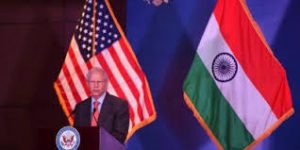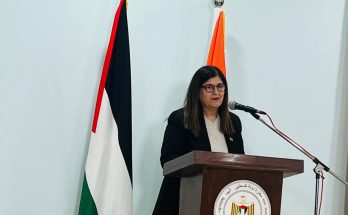
In a pointed message to India before he heads back to the US and a new administration takes charge in Washington, US Ambassador to India Kenneth I. Juster has highlighted “frictions and frustrations” in the trade and investment ties with India during his tenure, which has prevented the signing of a “small” trade agreement.
Speaking at his farewell address on the US-India partnership, the outgoing US envoy underlined that while the US recognizes India’s growing economic might, it is also mindful of its restrictive trade policies that may hinder its smooth integration into the global value chains. “India’s expanding economy is likely to become an important driver for growth in the region,” but New Delhi’s self-reliance and “Make in India” initiatives have the potential to lead to higher tariffs and other trade barriers that could hit trade, Mr Juster said at an event co-organized by the US embassy and ORF.
The American diplomat stressed the Indo-Pacific is significant for the bilateral ties because the US recognizes India and the Indian Ocean as inextricably tied to East Asia and the Pacific region. The event focused on taking forward ties in key areas such as trade, defence, security, and energy and health care. The US is dedicated to not just bilateral relations, but to India’s rise on the world stage, he added.
The envoy, however, drew attention to “frictions and frustrations” that existed in trade and investment initiatives between India and the US, and said the two sides were unable to finalise even a “small trade package” despite persistent efforts. He pointed out that there were also growing restrictions on market access for some US goods and services, increasing tariffs, new limitations on free flow of data. He said that there was a “less-than-predictable regulatory environment for investors.”
He emphasised that the time had come for India and the US to develop guidelines and “even red lines” for a stronger Indo-Pacific architecture to tackle future challenges. Although he did not name China, he made implicitly clear that this framework of cooperation should enable everyone to prosper if countries respect each other’s sovereignty and committed to peaceful resolution of disputes. He stressed the need for both countries to preserve their commitment to diversity and tolerance to maintain their strength of bilateral ties and status in the world.
Mr Juster, who was appointed by the Trump administration to oversee key areas of the India-US strategic relations, will step down later this month. He expressed his frustration that in spite of the fact that the US is India’s largest trading partner, and India the 12th largest trade partner of the US, their bilateral trade was not near its potential. In 2019, trade between the two countries was worth $146.1 billion, up from $18.6 billion in 2001. He felt that greater openness on the part of India would boost trade and investment.
Partnering in Indo-Pacific
The American envoy noted that in 2017, US President Donald Trump had described America’s vision for a free and open Indo-Pacific region, enabling the two nations with diverse cultures to prosper together “side by side” and thrive in both freedom and peace. He spoke of the milestones achieved in the US-India partnership throughout the last four years of Trump administration.
He said the US National Security Strategy put it down on paper in 2017, welcoming India’s emergence as a leading power and a stronger strategic and defence partner.” “This is a lot of good news for the economic and commercial relationship. But I would be less than candid if I did not note that there are also frictions and frustrations on the trade and investment front. Despite persistent efforts, we were unable to conclude even a small trade package,” Mr Juster said adding that “As with the US, India would naturally like to enhance its economic security by increasing domestic production and reducing critical dependencies.”
Atmanirbhar Bharat not compatible
The US envoy that the current view in India is that the best way to meet these various objectives is through a policy of ‘self-reliance’, emphasising ‘Make in India’, while still seeking to be engaged globally, participate in global value chains, and be an exporter to the world. “It remains to be seen, he said, “whether all of these policies are compatible and mutually reinforcing, or whether they will lead to higher tariff and non-tariff barriers to trade.” He said that India’s restrictive trade policies “would limit India’s capacity to truly integrate into global value chains and, in the process, raise prices for Indian consumers.” Juster pointed out that as American and other companies are finding it “increasingly difficult to operate in China or seek to diversify away from Chinese-led supply chains,” India has a “strategic opportunity to become an alternative destination for manufacturing investments,” but the Indian government may need to take suitable action to benefit fully from the opportunity.
Commenting on the recent escalations on the India-China border along the Line of Actual Control (LAC) or in other parts of the Indo-Pacific, the Ambassador said, “The US and India are committed to a rules-based order, peace and diplomacy, while there are others who choose suicide vests or military incursions.” Replying to question on the issue, Juster said that the US has been “very supportive” amid the India-China border standoff. “We both share a vision of the Indo-Pacific region…and that is an inclusive vision that provides opportunities for all countries to grow and prosper but also wants to avoid incursions of any type, intimidations and predatory financing, and when there’s a situation that is along those lines, we cooperate to try to resist it.”
(Sanjeeb Baruah contributed inputs for this article)
Author Profile
- India Writes Network (www.indiawrites.org) is an emerging think tank and a media-publishing company focused on international affairs & the India Story. Centre for Global India Insights is the research arm of India Writes Network. To subscribe to India and the World, write to editor@indiawrites.org. A venture of TGII Media Private Limited, a leading media, publishing and consultancy company, IWN has carved a niche for balanced and exhaustive reporting and analysis of international affairs. Eminent personalities, politicians, diplomats, authors, strategy gurus and news-makers have contributed to India Writes Network, as also “India and the World,” a magazine focused on global affairs.
Latest entries
 DiplomacyJanuary 5, 2026India walks diplomatic tightrope over US operation in Venezuela
DiplomacyJanuary 5, 2026India walks diplomatic tightrope over US operation in Venezuela India and the WorldNovember 26, 2025G20@20: Africa’s Moment – The Once and Future World Order
India and the WorldNovember 26, 2025G20@20: Africa’s Moment – The Once and Future World Order DiplomacyOctober 4, 2025UNGA Resolution 2758 Must Not Be Distorted, One-China Principle Brooks No Challenge
DiplomacyOctober 4, 2025UNGA Resolution 2758 Must Not Be Distorted, One-China Principle Brooks No Challenge India and the WorldJuly 26, 2025MPs, diplomats laud Operation Sindoor, call for national unity to combat Pakistan-sponsored terror
India and the WorldJuly 26, 2025MPs, diplomats laud Operation Sindoor, call for national unity to combat Pakistan-sponsored terror







